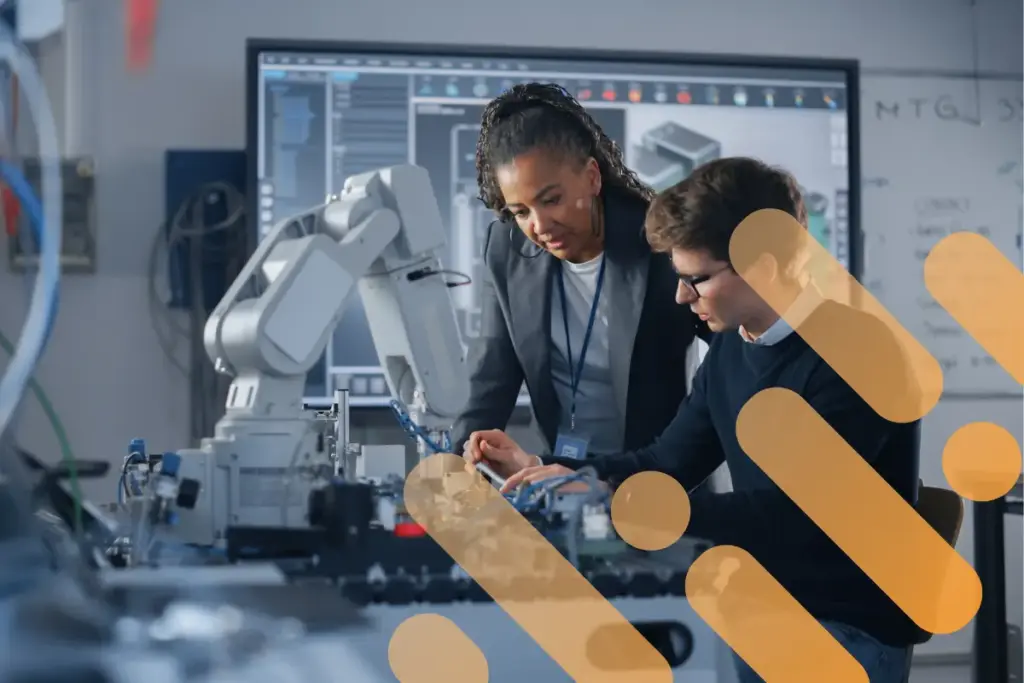
9 Mechatronics Engineer Interview Questions and How to Answer Them

Landing a mechatronics engineering job requires more than just technical skills. You must show employers you can think independently and solve complex problems. The interview process tests both your knowledge and your ability to communicate clearly.
Mechatronics combines mechanical engineering, electronics, computer science, and control systems. This means interview questions cover a wide range of topics. Preparing for these questions helps you stand out from other candidates.
What is Mechatronics Engineering?
The field involves designing intelligent systems that combine mechanical parts and electronic controllers. Robotic systems, automated machinery, or household control systems are some of the many components you can work with.
Mechatronics engineers create, construct, and maintain these hybrid systems. They work in a variety of industries to create functional products. The job requires understanding how one technology affects another.
Common Technical Questions
Question: Describe the difference between an open-loop and a closed-loop control system.
This question tests your basic control theory knowledge. Keep your answer simple and use examples.
Sample answer: “An open-loop system is not given any feedback. So, it performs pre-programmed actions regardless of its output. The washing machine timer is a good example. A closed-loop system uses feedback to change its action. A thermostat is a good example of a closed-loop one, for it monitors temperature and adjusts heating accordingly.”
Question: What programming languages do you use for mechatronics projects?
Employers want to hear about your skills in coding. Honestly state your level of expertise.
Sample answer: “I am most familiar with embedded systems in C++ and data analysis in Python. I also have experience in MATLAB for simulation and ladder logic for PLC. Learning new languages, depending on project needs, is something I am looking forward to doing.”
Question: How do you approach troubleshooting a malfunctioning automated system?
This question evaluates your problem-solving process. Walk through your methodology step by step.
Sample answer: “I first determine when it started going wrong and the symptoms. Next, I searched for the simple things, like power supply, cables, and fundamental settings. I use diagnostics to reduce any mechanical, electrical, or software problems. Once I know what’s wrong, I test my solution and implement it fully.”
Design and Problem-Solving Questions
Question: Design a simple pick-and-place robot for a manufacturing line.
This type of question tests your ability to think through a whole system. Break your response into separate parts.
Sample answer: “I’d start with the specifications – what sizes need to be what, in what period, and what level of accuracy. The mechanical components would include a gripper, arm joints, and base frame. The control and precise movement would be done through servo motors and encoders. The electrical components include motors and drivers, object sensors, and a PLC or microcontroller controller. The software would be responsible for motion planning and synchronization with the production line.”
Question: How would you integrate sensors into a mechatronic system?
Demonstrate your understanding of sensor integration and sensor choice principles.
Sample answer: “Sensor choice is determined by what you will measure and where. I examine accuracy, response time, and price. Integration involves good signal conditioning, matching a protocol for interfacing and offering electromagnetic compatibility. I have always included calibration routines and error detection in software.”
Behavioral and Situational Questions
Question: Tell me about a challenging project you worked on.
Use the STAR method—Situation, Task, Action, Result. Pick a project that showcases your technical and soft skills.
Sample answer: “At my previous company, we had repetitive jamming in our automatic production line. The production time was being wasted continuously day after day. It was my task to identify its cause and eradicate it. I checked mechanical time and sensor readings and concluded that the conveyor speed was not constant. I redesigned the drivetrain using more accurate speed control and added monitoring sensors. The jams were reduced by 90%, and total efficiency improved.”
Question: How do you handle working with cross-functional teams?
Mechatronics engineers often work together with mechanical engineers, programmers, and technicians. Illustrate that you can work well as a team.
Sample answer: “I value good communication and understanding each person’s boundaries. I make sure to understand mechanical limitations when coordinating with mechanical engineers. For the software team, I understand practical limits and time constraints. I have learned that frequent check-ins and shared notes help everyone stay on the same page.”
Industry-Specific Questions
Question: What safety considerations are important in mechatronic system design?
Safety is a top priority for automated systems. Show you understand both practical and regulatory aspects.
Sample answer: “Safety starts in design through risk analysis. Appropriate standards like ISO 13849 for machine safety are used. The top issues are emergency shutdown, safe failure modes, and proper guarding. Safety during maintenance is also considered – systems are designed to be serviced safely. The software has safety interlocks and fault detection.”
Question: How do you stay current with new technologies in mechatronics?
They want to see if you are committed to a lifelong learning process.
Sample answer: “I read magazines like Control Engineering regularly and attend webinars whenever possible. I am active in online forums in which engineers share examples of solutions to common problems. I even attempt to implement personal projects based on emerging technology to educate myself through practice. Recently, I learned about IoT implementation in industrial systems.”
Preparation Tips
Research the company and familiarize yourself with its offerings. Visit its website and recent news to discover its aims and aspirations. This will help you time your answers to meet their specific requirements.
Practice describing technical details simply. Good communication skills are very handy when communicating technical information to non-technical stakeholders.
Create examples based on your own experiences. Write down stories that depict problem-solving, team performance, and technical skills. Use figures and quantifiable outcomes to support your examples.
Refer to and examine fundamental principles in all areas of mechatronics and refresh control theory, as well as principles of programming, mechanical design principles, and electronics principles.
Prepare questions to ask the interviewer. Good questions show interest and enable you to determine if you are a good fit for the job. Ask questions regarding team makeup, ongoing projects, and career growth.
What Employers Want
Companies seek individuals who can adjust to evolving needs, in addition to technical qualifications. Technology is rapidly changing, and effective engineers are constant learners.
It is more essential than most candidates realize. You will need to communicate complex systems to varied groups and be able to work effectively in groups.
Problem-solving skills are needed. You need to demonstrate how you approach new situations and resolve complex problems.
Your Next Career Move
Preparing for mechatronics engineering interviews takes time and practice. The difficulty is showing technical familiarity and proficiency in translating that familiarity into practical problem-solving.
Remember, an interview is a conversation and not an interrogation. The employer is looking for a good match just like you. Be confident, be you, and think about how your skills will be used to solve their problems.
Ready to advance your career as a mechatronics engineer? Hunter Recruiting matches talented engineers like you with top companies in the fields of automation, robotics, and more. Our experienced recruiters understand the special requirements associated with mechatronics roles and can help you discover job openings that suit your skills and career objectives.
Contact Hunter Recruiting today to find excellent jobs in mechatronics engineering and advance your career in this exciting field.
If you are an employer looking for mechatronics staffing solutions, you can contact our team and we will be in touch within one business day.













